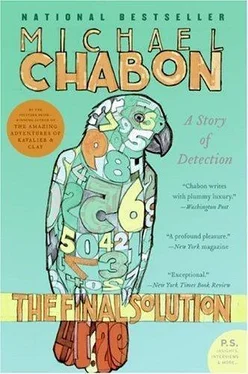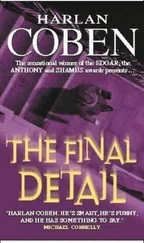"Good morning, sir. May I ask your reason for traveling to London?"
"Reason?"
Mr. Panicker looked at the old man, who looked back at him with a steady humorous unconcern.
"Yes," Mr. Panicker said. "Oh. Yes. Well, we've, ex, come to look for a parrot, haven't we?"
Mr. Panicker's wife, ruefully true to her married name, suffered from gephyrophobia, the morbid fear of crossing bridges. When a car, bus, or train in which she was riding hung suspended over some river, she would sink deeply into her seat, eyes closed, breath coming through her nostrils in short whistling gusts, moaning softly, holding herself perfectly still with the brimming cup of her fear clutched between her palms as if she dared not spill a drop. As Mr. Panicker drove through Croydon, the swift, haphazard gathering of the city around them appeared to arouse in the old man some allied phobic turbulence. The rasp of breath in the nostrils, the knuckles white as they gripped the hafts of his knees, the stayed cables of his wasted neck standing out-all these Mr. Panicker recognized as the signs of an all but unmasterable dread. Yet as they entered London the old man's eyes, unlike those of Mrs. Panicker when she found herself trapped mid-span, remained wide-staring open. He was, by irremediable nature, a man who looked at things, even when, as now, clearly they terrified him.
"You are unwell?"
For a full minute the old man made no reply and merely stared out the side window, watching the streets of South London slide by.
"Twenty-three years," he croaked. "August 14, 1921." He drew a handkerchief from some interior pocket, patted his brow, dabbed at the corners of his mouth. "A Sunday."
Affixing a date and day of the week to his last glimpse of London appeared to a degree to restore the old man's equilibrium.
"I don't know what I… silly. One has read so extensively about the damage from bombs and fires. I had prepared myself for a ruin. Indeed I confess to having in some measure anticipated, simply out of a kind of, well, let us be charitable and term it a 'scientific curiosity,' you know, the sight of this great city lying in smoking ashes along the Thames. But this is. ."
The adequate adjective eluded him. They were across the river now, and found themselves caught between and towered over by two high red trams. Rows of staring faces gazing down at them with inquisitorial indifference. Then the trams split off east and west respectively and, as if a pair of water gates had been lifted, the flood of inner London rushed over them. They had bombed it; they had burned it; but they had not killed it, and now it was sending forth growths and tendrils of some strange new life. To Mr. Pan-icker the thing that chiefly struck him, and had done over the year leading up to 6 June, was the startling American-ness of London: American airmen and sailors, officers, and foot soldiers, American military vehicles in the streets, American films in the cinemas, and an atmosphere of loud, raffish swagger, a smell of hair tonic, a cacophony of sprung vowels that might, as Mr. Panicker was prepared to concede, be entirely the product of his own imagination but which nevertheless animated the city for him in a way that he found at once appalling and irresistible, an air of riotous, brutal good humor, as if the invasion of Europe itself, now proceeding in bloody stages across northern France, were only the inevitable exploding forth of a buildup of jazzy slang and the uncontainable urge to buck and wing.
"That's new," the old man said, over and over, crooking a stiff finger toward some office block or housing estate. "That was not here." And then as they passed the somber hulk, often still festooned with streamers of gray smoke, of yet another bombed-out block of flats, simply, "Good God."
His voice, as they plunged deeper into the changes wrought in London by construction crews and German bombs since that Sunday afternoon in 1921, fell to a harsh, appalled whisper. Mr. Panicker imagined-he had a powerfully sermonizing imagination-that the old man must have been experiencing (rather belatedly, in the vicar's opinion) a kind of foretaste or demonstration of the nature of death itself. After his long absence from the city over which he had once exercised his quiet brand of domination, he had seemed to expect that it, like the world when we depart it, would stop changing, would somehow cease to exist. After us, the Blitz! And now here he was confronted by not simply the continued existence of the city but, amid the smoking piles of brick and jagged windowpanes, by the irrepressible, inhuman force of its expansion.
"Ashes," the old man said wonderingly as they passed a huge new area of emergency housing built by Mr. Churchill, like a vast tilled allotment sprouting row upon row of little tin houses. "I had thought to see nothing but smoke and ashes."
They drove along the grimy arches of the Bishopsgate Goodsyard and left the car by Arnold Circus, in a street that was greatly the worse for having borne the brunt of a German SC, beside a neat pile of paving stones salvaged from the blast and still awaiting redeployment. Then they walked around the corner into Club Row. Mr. Panicker was practiced and even authoritative in his offering of a steadying arm to the elderly, but the old man refused his every attempt, having declined even to let the vicar help him out of the cramped interior of the car. As soon as he found himself on the ground, so to speak-as soon as the hunt commenced, as Mr. Panicker could not help putting it, somewhat romantically, to himself-he seemed to shake off the phobic bewilderment of the voyage. He held his chin high and gripped the head of his stick as if very soon he intended to begin swinging it toward the deserving skulls of ruffians. As they turned into Club Row, in fact, Mr. Panicker found himself hard-pressed to keep up with the long crooked scarecrow stride of the old man.
And indeed Club Row had changed very little, if at all, since August 1921 or, indeed, he supposed, since the August of 1901, or 1881. Some long-forgotten business had carried Mr. Panicker here, one Sunday morning years before. He recalled how the street seemed inanely alive with the horrid cheer that haunted zoos and menageries, how the cries of bird sellers, of puppy wallahs and cat peddlers intermingled and created an eerie and disturbing echolalia, at once mocking of and mocked by the chatter of their caged and staring stock in trade. In spite of the fact that he had known perfectly well, as he passed them, that the lorikeets and budgerigars, the spaniels and tabbies, and even the odd sharp-eyed weaselish thing, were to be sold and purchased as pets, Mr. Panicker had not been able to rid himself, as he proceeded along Club Row on that forgotten errand, of the notion that he was walking down a street of the condemned, and that all of this sad caged animal flesh was intended only for the slaughter.
Today, however, the Row was silent, haunted only by the litter and faint invisible gutter-drip of the Monday after market day. Torn wrappers, bits of greasy newsprint, twisted hanks of rag, sawdust caked in puddles of fluids on whose nature Mr. Panicker preferred not to speculate. The stalls and shops dark behind their curtains of articulated bars and padlocked steel shutters. Above the storefronts, the low, disreputable buildings jostled one another, in serried ranks, like rounded-up suspects trying to exhibit a collective and wholly spurious innocence, while their brick cornices leaned ever so slightly inward over the row, as if to peer into the breast pockets of passing marks. It was, or ought to have been, a singularly depressing prospect. And yet the verve and energetic tread of the old man, the vaguely drum-majorish way in which he swung his heavy stick, inspired Mr. Panicker with a giddy and surprising optimism. He felt a mounting sense, as they headed down toward Bethnal Green Road-a sense that had obscure roots in that vanished market morning when he had passed amid the hectic stalls of the dealers in animals-that they were penetrating to the heart of some authentic mystery of London, or perhaps of life itself; that at last, in the company of this singular old gentleman whose command of mystery had at one time been spoken of as far away as Kerala, he might discover some elucidation of the heartbreaking clockwork of the world.
Читать дальше
Конец ознакомительного отрывка
Купить книгу












